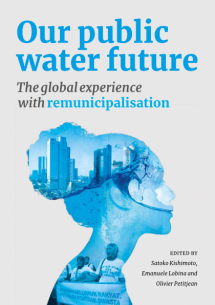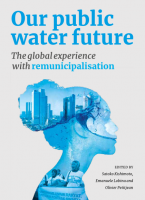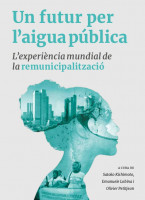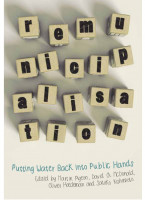Our Public Water Future The global experience with remunicipalisation
Topics
Privatisation on the backfoot as new book shows that the growing wave of cities putting water back under public control has now spread to 37 countries impacting 100 million people.

Authors
TNI has joined with a number of organisations to launch Our public water future: The global experience with remunicipalisation that details the growing wave of cities and communities worldwide that are bringing water services back under public control.
The book is launched in the run-up to the World Water Forum in South Korea (12-17 April) and comes in the wake of Jakarta’s decision in March 2015 to annul its privatised water contracts citing the violation of the 9.9 million residents’ human right to water.
This is the largest remunicipalisation in the world, suggesting that water privatisation is running out of steam and the pendulum is swinging back in favour of a reinvigorated, accountable and sustainable public control of water.
The TNI book is co-published jointly with Public Services International Research Unit (PSIRU), Multinationals Observatory, European Public Services Union (EPSU) and the Municipal Services Project (MSP).
Key findings of the book
Water remunicipalisation refers to the return of previously privatised water supply and sanitation services to municipal authorities, and is also broadly used to refer to regional and national-level services in some cases.
Between March 2000 and March 2015, researchers have found:
- 235 cases of water remunicipalisation in 37 countries, affecting over 100 million people
- Number of cases doubled in the 2010-2015 period compared with 2000-2010
- Cases are concentrated in high-income countries, with 184 remunicipalisations compared to 51 in low- and middle-income countries
- The great majority have taken place in two countries: France (94 cases) and the US (58 cases)
- Public water operators are joining forces within and across countries to facilitate the remunicipalisation process
From Jakarta to Paris, from Germany to the United States, this book draws lessons from this growing movement to reclaim water services. The authors show how remunicipalisation offers opportunities for developing socially desirable, environmentally sustainable and quality water services benefiting present and future generations. The book engages citizens, workers and policy makers in the experiences, lessons and good practices for returning water to the public sector.
Table of contents
- Introduction Calling for progressive water policies [PDF] Emanuele Lobina
- Global list of remunicipalisations [PDF]
- Chapter 1 Water in public hands: Remunicipalisation in the United States [PDF] Mary Grant
- Chapter 2 An end to the struggle? Jakarta residents reclaim their water system [PDF] Irfan Zamzami and Nila Ardhianie
- Chapter 3 German municipalities take back control of water[PDF] Christa Hecht
- Chapter 4 Turning the page on water privatisation in France [PDF] Christophe Lime
- Chapter 5 Taking stock of remunicipalisation in Paris. A conversation with Anne Le Strat [PDF] Olivier Petitjean
- Chapter 6 Remunicipalisation and workers:Building new alliances [PDF] Christine Jakob and Pablo Sanchez
- Chapter 7 You are public…now what? News ways of measuring success [PDF] David A. McDonald
- Chapter 8 Trade agreements and investor protection: A global threat to public water [PDF] Satoko Kishimoto
- Conclusion Reclaiming public water through remunicipalisation [PDF] Satoko Kishimoto, Olivier Petitjean and Emanuele Lobina
Pages: 132
News: new articles are added to Eau publique, eau d’avenir in June 2015 (French edition of Our Public Water Future).
Find English translation.
- Foreword [PDF] By Célia Blauel
- Nice: building a public water company after 150 years of private management [PDF] by Olivier Petitjean
News: new article is added to Un futur per l’aigua pública in September 2015 (Calatan edition of Our Public Water Future).
Find English Translation
- Window of opportunity for public water in Catalonia [PDF] By Eloi Badia and Moisès Subirana





